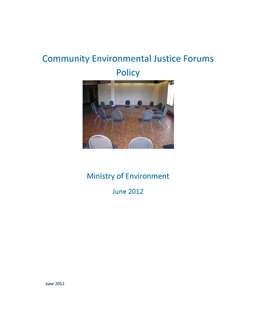Restorative Justice
Restorative justice is a set of guiding principles used in dispute resolution. Restorative justice interprets crime as a violation of people, relationships and community values and seeks restorative outcomes rather than assigning blame and punishment. Led by trained facilitators, restorative justice forums offer a timely and cost effective way to deal with certain environmental offenses in an inclusive forum designed to promote offender accountability, repair the harm caused by the offense and restore compliance.
Community Justice Forums and Community Environmental Justice Forums are the types of restorative justice most commonly used in environmental compliance and enforcement cases:
Community Justice Forums (individuals)
A Community Justice Forum (CJF) is a traditional community led restorative justice process most appropriate for individual offenders and smaller files (e.g. loaded firearms). To conduct a CJF, government uses trained facilitators and other community-based organizations specializing in restorative justice.
Community Environmental Justice Forums (companies)
A Community Environmental Justice Forum (CEJF) is a process used to respond to environmental offences committed by regulated companies and organizations. While founded on the same principles as traditional restorative justice, these forums differ in the amount of pre-forum work done by the facilitator to ensure an outcome commensurate with the violation and acceptable to all participants. The CEJF process is voluntary – ministry enforcement staff, the offending company, and the affected community must agree to participate. The facilitator works with all the parties in advance of the forum to ensure they understand the process and what is expected of them.
A CEJF usually takes 2 – 2.5 hours, during which time participants discuss how and why the incident occurred and the impact it has had on the environment, the community, and the company. Collectively, the group agrees on appropriate restitution for the offence which is recorded in a written agreement. All participants sign the agreement and monitors are appointed to ensure timely follow-through by the company. Restitution can take a variety of forms such as environmental restoration projects, financial penalties, community service, and a public declaration by the company of their responsibility and remorse. The successful conclusion of a CEJF is expected to result in the following outcomes:
- restore or compensate for harm done to the environment
- promote a sense of responsibility in the offender
- acknowledge and repair harm done to a community
- improve long term compliance (reduce the likelihood of recidivism)
- build positive relationships between the offender, the community and regulators
- promote general deterrence.
Video (2.5 minutes):
Following a leachate overflow into Stoney Creek in September 2010 and a mercury discharge into the Columbia River in October 2010, Trail Teck Metals participated in a Restorative Justice forum. In the end, Teck agreed to all recommendations sought by the Ministry of Environment and Climate Strategy and then looked internally for additional actions to avoid future discharges. What could have taken years in the criminal justice system took only 33 days to complete.
The Community Environmental Justice Forums Policy (PDF, 380KB) outlines compliance and enforcement considerations for forums facilitated by the Ministry of Environment and Climate Change Strategy.
Additional resources:

